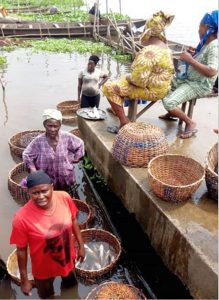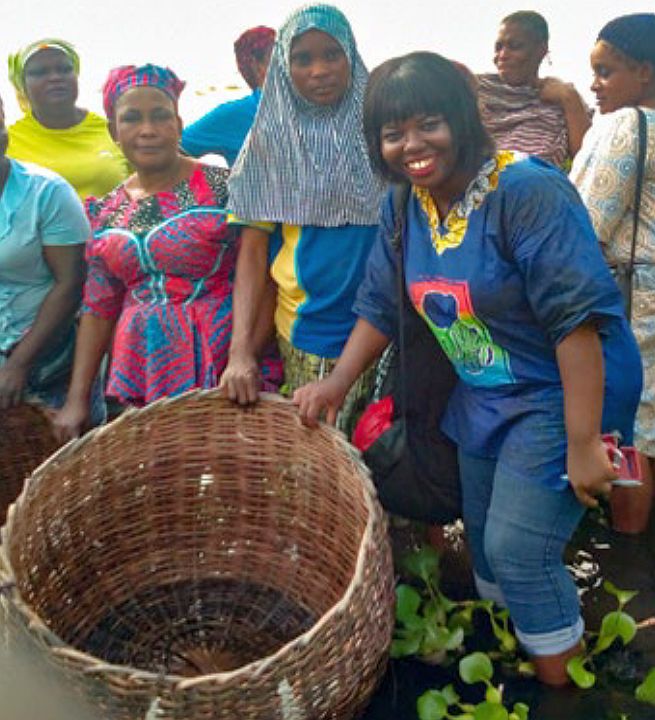Gender norms maintain a hierarchy of power and privilege that emphasize a gender binary, reinforcing a systemic inequality that undermines women’s rights and limits women’s opportunities.
Among the socio-cultural taboos shaping participation in and benefits from fisheries activities, gender-specific taboos are particularly significant. Taboos are unwritten laws based on societal values that are transmitted through socialization; they help define who and how various groups and individuals in the community have access to fishing and fish (Oloko et al. 2021). These also govern how people relate to the environment around them by prohibiting certain behaviors or actions because they are considered harmful or sacred (Olokor et al. 2013). Despite the efficacy of taboos in mediating fishing activities in the Global South, these have been given limited attention from a gender perspective.

Some gender-specific taboos are beneficial to women while others relate to behaviors that are considered powerful or are referred to as ‘bad luck’ for fishing. However, various forms of traditional cultural practices i.e., taboos, rules and regulations, customs and rituals, among other strategies, have promising potential to increase sustainable resource utilization, conservation, ecological and environmental protection. The research on the impact of taboos and norms on gender roles in small-scale fisheries has been very limited. Gender norms are informal “rules” that control behaviors that are deemed appropriate, acceptable, or desirable for women and men in each society. Although in many contexts women’s roles in the fishing industry are defined by gender norms and taboos, there has been limited exploration of how gender norms and related taboos define how women engage in fisheries. This may be, in part, due to the long-held perception that fishing is a masculine sector and profession. However, with increasing work highlighting the considerable participation of women in fisheries, this perception is changing.
Globally, women worldwide participate in activities such as lagoon fishing, intertidal shrimp fishing and gleaning and reef gleaning. Women’s gleaning contributed to livelihood and food security in the Danajon Bank region of the Philippines. Women in West Africa and eastern Indonesia spent at least three hours per day gleaning and harvesting fish from the ker, a female-only fish trap. In addition to engaging in near shore fishing activities, women are particularly prevalent in the postharvest sector, as onshore laborers, traders, buyers, financiers, and pre-fishing onshore preparation (for example, securing fuel, ice, bait, and recruiting crew) especially in the Global South small-scale fisheries. The gendered division of labour in the fisheries sector is established and maintained by gender norms in specific social-cultural contexts, which for women are often limiting.
Gender inequality and gender relations in fisheries have a chequered history attributed to pre-colonial, colonial and post colonial periods, respectively. For example, in some contexts it is socially unacceptable for women to engage in harvesting activities or participate in governance of small-scale fisheries, and in other contexts, such as Egypt, women fish traders are expected to seek their husband’s permission before engaging in any financial endeavors. Given evidence for gender norms and taboos limiting mobility, livelihood opportunities and fish consumption for women, understanding the role of gender norms and taboos in fisheries is critical to improving fisherfolk livelihoods and advancing broader goals with respect to sustainable development.
Initiatives aimed at improving livelihoods continue to be “gender blind,” failing to account for the norms and relationships that influence how women and men in fisheries experience different opportunities and outcomes. Men often have a broader range of livelihood options, even with toxic or hyper masculinity risk behaviour, than women fisherfolk, who are often constrained by individual risk perceptions and socially prescribed physical mobility restraints.
The prevailing global understanding is that livelihood initiatives are more likely to produce long-term and equitable results if they are designed with an understanding of the different ways male and female fisherfolk engage in and experience their livelihoods. Gender inequalities among individuals are supported by norms and relations that govern the various roles, responsibilities, and expectations that society places on fishers and women fisherfolk. Women’s plight is associated with discriminatory processes, which are exacerbated by cultural taboos, traditional beliefs, laws, and norms governing their human-sea interaction, which in turn position them at the lowest end of fish value chains (Oloko et al. 2022b; Harper et al. 2023).
Taboos can have negative impacts on women’s access to nutritious food. For example, octopus, shrimp, and porcupine fish were not consumed by some women fisher folk in Tanzania because of a fear of developing acne, skin rashes, and asthma, which was thought to possibly result in death. Thus, food taboos relating to fish appear to have been imposed disproportionately on women, pointing to the gendered nature of these taboos (Oloko et al.2022a). As in the case of dietary taboos, taboos in relation to fishing equipment are also gendered with women not permitted to touch specific fishing gear. This prohibition is often linked to impurities attributed to women’s bodies. However, these restrictions, for various reasons, may have an impact on fish stocks by controlling the utilisation of specific species within a defined area. Given that fisheries are sometimes referred to as a last-resort occupation, women’s comparatively low participation in fish value chains contributes to gender inequities in terms of income and often entrenches women in poverty. Gender inequality in small-scale fisheries is a component of the broader systematic marginalisation of poor working women fisher folk.
This inequality not only undermines their contribution to food security but also undervalues their role in sustainable marine resource management and sustainability. This has exacerbated unequal economic power relations and reinforced by patriarchy system, thereby further perpetuating gender hierarchies and discrimination in the small-scale fisheries sector. Such gender injustices in fisheries have been experienced globally, especially in the countries of the Global South. For example, in Ghana, governing structures influence men’s control and accessibility in the fish processing and trading industry. Other forms of gendered inequalities linked to gender taboos have further reduced women’s access to fishing resources. Menstruation taboos are widespread in other areas of women’s lives besides fisheries in many countries of the Global South. For example, in Talensi, Ghana, traditional taboos prevent menstruating women from accessing sacred groves, because menstruating women’s body fluids are thought to be extremely polluted and contaminating.
A gendered approach from a socio-cultural perspective is required to address common misconceptions about gender and other social attributes such as class, norms, and taboos that influence women’s productivity in fisheries. The intersectionality of gender taboos and norms in this article highlights sociocultural and economic dynamisms that exacerbate inequalities since they isolate gender as a separate agency, hence limiting their potential to contribute to sustainable fisheries practices and management. We argue that any effort to integrate gender into small-scale fisheries should address the way that power relations and local norms are gendered and sustained. Traditional knowledge and belief systems can play an important role in contemporary governance systems, making valuable contributions towards sustainable fisheries; however, understanding the role that taboos play in mediating human interactions with ocean resources, especially those limiting women’s access to such resources, is necessary for advancing gender equity in small-scale fisheries.
Authors
1 University of British Columbia, Institute for the Oceans and Fisheries, Vancouver, BC, Canada
2 The University of Victoria, School of Environmental Science, Victoria, BC, Canada
3 Lagos State University, Department of Fisheries, Lagos State, Nigeria
4 University of British Columbia, School of Public Policy and Global Affairs, BC, Canada
References
Olokor, A., K.A. Fakoya, and A. O. Saba. 2013. The meeting point between fisheries science and traditional ecological knowledge in fisheries. In: 28th Annual Conference of the Fisheries Society of Nigeria (FISON), 25-29 Nov 2013, Abuja, Nigeria 310-312.
Oloko, A., K. Fakoya, and S. Harper 2021. Taboos as Cultural Challenges Encountered by Women Fisher Folk in Some Coastal Fishing Communities in Nigeria. SPC Women in Fisheries Information Bulletin 33:48-49.
Oloko, A., K. Fakoya, and S. Harper 2022a. Exploring gender and food taboos in fisheries of the Global South. SPC Women in Fisheries Information Bulletin 36:32-33.
Oloko, A., K. Fakoya, S. Ferse, A. Breckwoldt, and S. Harper 2022b. The Challenges and Prospects of Women Fisherfolk in Makoko, Lagos State, Nigeria. Coastal Management DOI: 10.1080/08920753.2022.2022969.
Harper, S., Kleiber, D., Appiah, S., Atkins, M., Bradford, K., Choudhury, A., Cohen, P.J., de la Puente, S., de la Torre-Castro, M., Duffy-Tumasz, A., Fakoya, K., Fent, A., Fröcklin, S., Gopal, N., Gough, C., Gustavsson, M., Hapke, H.M.,Hellebrandt, L., Ferrer, A.J., Johnson, J.L., Kusakabe, K., Lawless, S., Macho, G., Mangubhai, S., Manyungwa-Pasani,C., McDougall, C., Ojea, E., Oloko, A., Pedroza, C., Randrianjafimanana, T., Rasoloniriana, R., Robson, L., Romeo, C.,Salgueiro-Otero, D., Snyder, H., Soejima, K. 2023. Towards gender inclusivity and equality in small-scale fisheries.In: FAO, Duke University & WorldFish. 2023. Illuminating Hidden Harvests: the contributions of small-scale fisheries to sustainable development. Rome, FAO; Durham, USA, Duke University; Penang, Malaysia, WorldFish.

This entry was posted in: Africa, Men, Nigeria, Women
